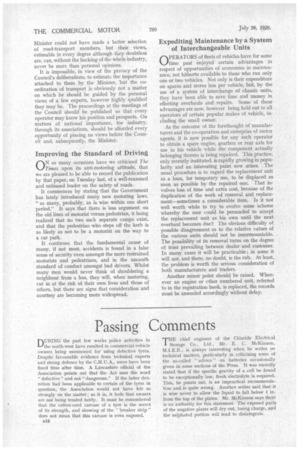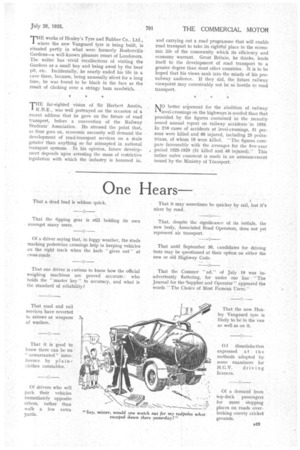Passing Comments
Page 36

Page 37

If you've noticed an error in this article please click here to report it so we can fix it.
DURING the past few weeks police activities in the north-west have resulted in commercial-vehicle owners being summoned for using defective tyres." Despite favourable evidence from technical experts and strong defence by the C.M.U.A., users have been fined time after time. A Lancashire official of the Association points out that the Act uses the word "defective" and not "dangerous." If the latter dennition had been applicable to certain of the tyres in question, the Association would not have felt so strongly on the matter ; as it is, it feels that owners are not being treated fairly. It must be remembered that the cotton-cord carcase of a tyre is the secret of its strength, and showing of the " breaker strip" does not mean that this carcase is even exposed. n18 THE chief engineer of the Chloride Electrical Storage Co., Ltd., Mr. E. C. McKinnon, M.I.E.E., is always interesting when he writes on technical matters, particularly in criticizing some of the so-called " advice " on batteries occasionally given in some sections of the Press. It was recently stated that if the specific gravity of a cell be found to be exceptionally low, fresh electrolyte is required. This, he points out, is an impractical recommendation and is quite wrong. Another writer said that it is wise never to allow the liquid to fall below 1 in from the top of the plates. Mr. McKinnon says there is no authority for this statement. The exposed parts of the negative plates will dry out, losing charge, and the sulphated portion will tend to disintegrate.
THE works of Henley's Tyre and Rubber Co., Ltd., I where the new Vanguard tyre is being built, is situated partly in what were formerly Rosherville Gardens--a well-known pleasure resort of Londoners. The writer has • vivid recollections of visiting the Gardens as a small boy and being awed by the bear pit, etc. Incidentally, he nearly ended his life in a cave there, because, being unusually silent for a long time, he was found to be black in the face as the result of choking over a stringy ham sandviich.
THE far-sighted vision of Sir Herbert Austin,
K.B.E., was well portrayed on the occasion of a recent address that he gave on the future of road transport, before a convention of the Railway Students' Association. He stressed the point that, as time goes on, economic necessity will demand the development of road-transport services on a kale greater than anything so far attempted in national transport systems. In his opinion, future development depends upon arresting the mass of restrictive legislation with which the industry is hemmed in,
and carrying out a road .programme that will enable road transport to take its rightful 'place in the economic life of the community which its efficiency and economy warrant. Great Britain, he thinks, lends itself to the development of road transport to a greater degree than most other countries. It is to be hoped that his views -sank into the minds of his prorailway audience. If they did, the future railway viewpoint may conceivably not be so hostile to road transport.
MO better argument for the abolition of railway 1 Ilevel-crossings on the highways is needed than that provided by the figures contained in the recently issued annual report on railway accidents in 1934. In 210 cases of accidents at level-crossings, 31 persons were killed and 68 injured, including 25 pedestrians, of whom 19 were killed. " The figures compare favourably with the averages for the five-year
, period 1925-1929 (51 killed and 48 injured)." This rather naive comment is made in an announcement issued by the Ministry of Transport.




































































































